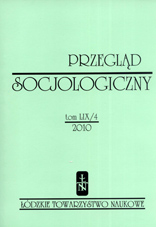Transformacja sieciowa funkcji państwa polskiego
The Network Transformation of the Polish State Functions
Author(s): Kamil Filipek, Slawomir PartyckiSubject(s): Social Sciences
Published by: Łódzkie Towarzystwo Naukowe
Keywords: network transformation; global power networks; external pressure; soft power; state branding; governance
Summary/Abstract: The importance of networks in the transformation of the Polish state functions is underestimated. This is probably because the awareness of the network structures is not common and the network analysis is still new research tool in contemporary social science. It’s impossible to understand the transformation of the Polish state functions without understanding the role played by network forms of organization and communication. In the modern world, networks are often used as the exchange platforms enabling dynamic move of goods, ideas, values etc. Deeply involved in this exchange are: states, transnational corporations, criminal groups, terrorist networks, nongovernmental organizations, global social movements and citizens organized in various associations, clubs, and unions. All of these actors meet together on the interrelated planes, participating in ephemeral and permanent, single and repeated acts of exchange. Networks re-define the position of the Polish state in the global power structure. The new position is produced by three interlocking vectors: economic transformation in Central and Eastern Europe; European integration; and globalisation. The nation-state involved in three contradictory network realms is unable to fulfil many crucial functions. Success on the global stage depends on the ability of states to identify and redefine themselves. In case of Poland, the most urgent issue seems to be the reorientation of public institutions to implement the regional and global functions. This essay presents the directions of the reorganization of the functions of the Polish state, as well as the benefits and risks associated with this process.
Journal: Przegląd Socjologiczny
- Issue Year: 59/2010
- Issue No: 4
- Page Range: 125-144
- Page Count: 20
- Language: Polish

